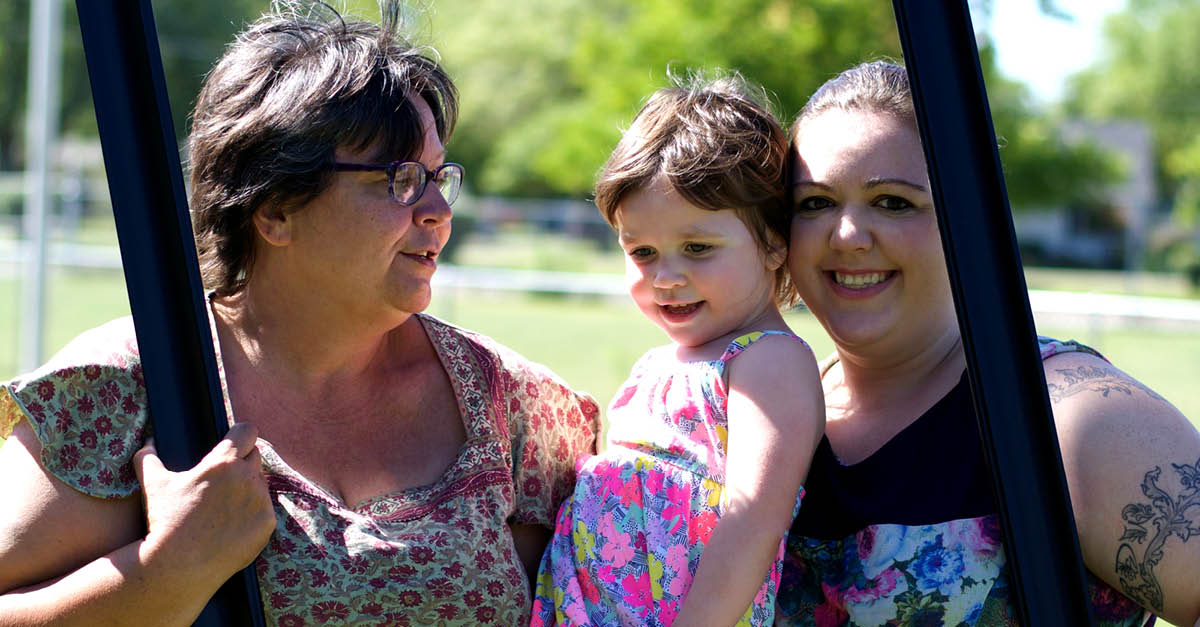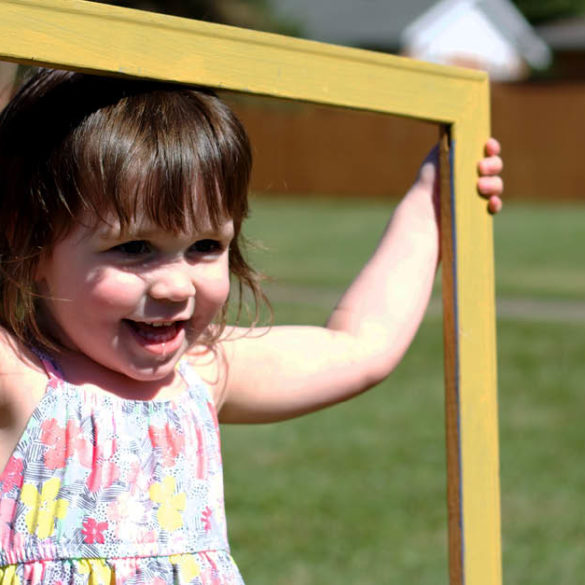Two-year-old Brigette threw a tantrum in protest. She insisted that Grandma come to bed, too. Brianna, drained of all energy and ready for her daughter to get some sleep, hopelessly tried to get Brigette to stop running back to Grandma and get in bed.
Brigette was not having any of it. She screamed and stomped her feet. She didn’t want to go to bed while Grandma was still awake in the living room. She motioned her hand toward Grandma and whined for her to come with them. Brianna sighed. She knew getting Brigette to sleep would be a hassle, especially because they sleep in the same bed.
Brianna Kern is a 24-year-old stay-at-home mom who lives with her mother, step-father, and older brother. She is one of the 25 percent of Millennials who are already parents, according to Millennial Marketing, a Barkley-owned website that uses research to inform marketers of trends about the Millennial generation.
Millennials are more likely to raise their kids in the same house as extended family, like Brianna does, or nearby extended family. Pew Research Center reports that this multi-generational style of living is making a comeback, and in 2011, Millennials between the ages of 25 and 34 were most likely to live in multi-generational households compared to all other age groups.
In 2012, nearly 57 million Americans lived in multi-generational homes. This is in contrast to the decline of extended family households that happened throughout most of the twentieth century.
“It’s a village,” said Brianna. “Everybody’s helping [with Brigette]; nobody’s upset that she’s there or is inconvenienced in any way.”
Bonnie Harris, a parenting specialist and director of Connective Parenting, says that living with extended family is the best way to raise a child, as long as the family agrees on how. She said there is a lot to be learned about parenting from tribal cultures, and raising a child with extended family is, in a sense, raising children the way many tribal cultures did.
Brianna’s mother, Marilee Creech, loves getting to see her granddaughter every day. She doesn’t have to worry about missing any part of Brigette’s life, and she is there to help Brianna when she needs it.
However, she thinks there is a lack of privacy that comes with living with her children and granddaughter. At times, she wants a break from taking care of Brigette and just wants to be the grandma who spoils her granddaughter. That isn’t always possible because there are so many people living in the same space.
Marilee wants Brianna and Brigette to read more and to do more imaginary, interactive play instead of passive activities, like watching TV. She thinks that teaching Brigette through playing with her is important for her development. She also doesn’t want Brianna to miss out on having play time with Brigette – something she won’t have forever.
Additionally, Marilee is more worried that Brigette could get hurt when she plays on her own and thinks she should be more supervised. Brianna, on the other hand, isn’t as concerned that her daughter will get hurt when she plays on her own and tends to be more laid back.
“Sometimes Brianna gives her a little too much range,” said Marilee. “She can destroy a house in ten seconds without enough guidance.”

Brianna didn’t always have her family there to help. Brianna just moved back home in February 2015. Before that, she lived in Virginia with her husband.
Brianna would ask her husband to do dishes, bathe Brigette, clean the house – things a working husband might not normally do, and he did them. Although Brianna felt she ran most of the household, she knows it would have been more difficult if her husband hadn’t pitched in, too.
At night they would climb into bed, and Brigette would sleep in a basket between them – a routine that began just after she was born. Brianna could not get out of bed to tend to her newborn after having a Caesarian section. They tried the crib for around a month, but Brigette slept better next to her parents.
The “team” parenting style is not uncommon for Millennials. Millennial Marketing found that 50 percent of Millennial moms and 64 percent of Millennial dads believe parenting should be shared equally.
Six in ten Millennials also say they want to raise their kids differently than how they were raised. Although this statistic is relative to how the parents themselves were brought up, Millennials lean toward more unstructured playtime, less junk food, and a more hands-off approach to parenting, according to Millennial Marketing.
Millennial Marketing states this hands-off approach may be in reaction to the helicopter parenting style, which was characteristic of Baby Boomer parents.
Bonnie says a hands-off approach to parenting is a positive thing, because often parents don’t realize how much children can learn when they have unstructured play. The amount of structure and supervision given to Brigette is one conflict that has come up while raising her with extended family.
Being a stay-at-home mom allows Brianna to witness every milestone and new experience in her daughter’s life. She gets to watch Brigette grow a little more every day without missing out on anything.
This was Brianna’s plan until her divorce. Being on her own, Brianna knew she would eventually have to start working again and wouldn’t get to be a stay-at-home mom forever. Not being with her daughter during the day wasn’t as concerning knowing that her family would be there, until she realized that meant she couldn’t be there for all of her daughter’s events.
During the summer, Brianna started school at Ivy Tech to be a massage therapist. Three times a week she is gone for the day and doesn’t get to see Brigette as much. This experience is difficult, but rewarding. Brianna said it is a way to show her daughter that she can be whatever she wants to be and doesn’t need to be dependent on a man for anything.
Going to school seemed like a painless decision. That is, until class conflicted with Brigette’s tee-ball schedule.
One Monday in August, Brianna sat in class, anxious and on the edge of her seat. All she could think about was how much time remained until Brigette’s game. She knew it was impossible to make it home in time. She would have to miss it and hear all about it later that evening from her family. She turned to her close friends and vented about how upset it made her, completely distracted from the work she was supposed to be doing.
Tears welled up, but she fought them off. This was no time to cry, she was in class to benefit her family – this was just one of the sacrifices she had to make for Brigette. Focusing on classwork was hard enough while she was away from her daughter, but it was much harder because she was missing her game. She would be absent for a milestone in Brigette’s life – an experience that she would never get back – because she needed to be in school to make a better life for herself and her daughter.
“It’s hard. We live in this society where you just can’t win,” said Brianna. “If you’re a stay-at-home mom, you’re lazy. If you’re a working mom, you’re abandoning your kid.”
Later that month, Brianna and Brigette went to a local park to play, like they often do. Brigette pulled herself up onto the playsets and went down slides. She climbed over every obstacle and swung from bars on the playground equipment, smiling and laughing as she ran from place to place.
Brianna sat on the side and watched her daughter run back and forth. The chill of fall lurked in the air, Brigette’s hair was mussed, and she had dirt on her clothes and on her cheek. That didn’t matter to Brianna.
Brigette fearlessly approached older kids and played on contraptions much too advanced for a two-year-old. But somehow, she managed to climb to the top of an apparatus more than twice her size and was holding on with both hands. An uneasy expression emerged on her face as she looked at the ground below her. Brianna just watched.
“Scary!” Brigette yelled to her mother.
It was then that Brianna stood up and walked over to help her daughter down. When she did, Brigette sprinted off in another direction and started to climb again.




